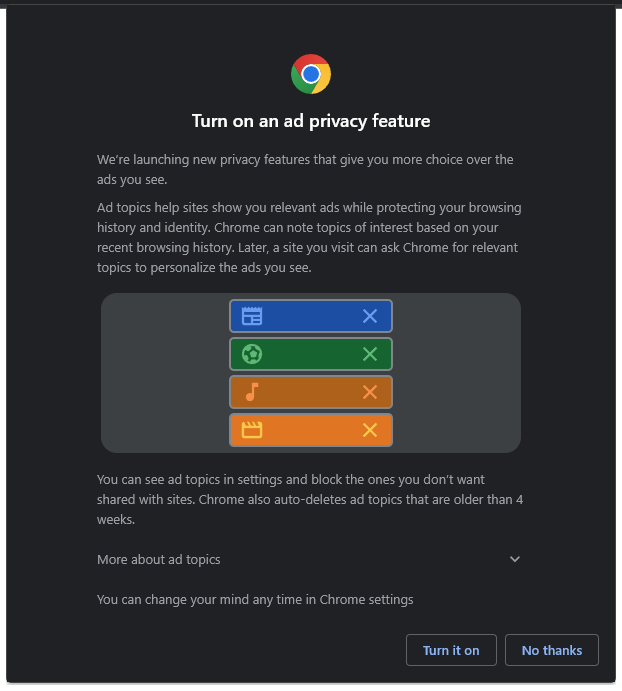this post was submitted on 25 Oct 2023
748 points (95.7% liked)
privacy
6306 readers
110 users here now
Big tech and governments are monitoring and recording your eating activities. c/Privacy provides tips and tricks to protect your privacy against global surveillance.
Partners:
- community.nicfab.it/c/privacy
founded 3 years ago
MODERATORS
you are viewing a single comment's thread
view the rest of the comments
view the rest of the comments

There is a lot of misinformation being shared in this thread.
A good excerpt from Steve Gibson covering Topics on SecurityNow #935
...
...
SecurityNow #935 transcript
It seems unlikely, though, that advertisers will give up on the nuanced tracking they can get by other means, right? Whether to show you the $2 rip off umbrella that works for a single rainy day, or the $52 Proposal Pink (TM) ultra-certified umbrella that keeps the rain off for a single rainy day.
They won't be given the choice. The point is giving them some compromise in order to disable other tracking abilities from the browser. The big question with all of this isn't whether it improves on the user's privacy from the status quo. It's what happens when Google effectively monopolizes most of the access to advertising data. I'm not crying for third party ad companies, I think there might be some unforseen consequences for users down the road.
But how so? Just that Google will stop feeding them personal data the ways it currently does? Or that Chrome would actively work to block fingerprinting and trackers the way and blockers and Firefox do?
Because fingerprinting happens whether the user's browser 'allows' it or not.
Ok, so you mean most of what most companies get is fed from Google's tracking? So most would lose most of their data. But not that rely on Amazon/Meta/etc who are doing their own dirty work.
I think they'll do this.
Today everyone installs cookies and what not and tracks however they can. Once Google goes the Firefox route disabling and mitigating tracking abilities in Chrome, the only gateway to tracking data will be the data gathered by Google via Chrome and exposed via some Google-controlled API to third parties. So I think that eventually what most companies get fed by will be Google's tracking.
Yup. And probably.
So better than the status quo, unless you're a smaller ad company.
Yeah - this is the privacy model that ad targeting should have always taken. People are grabbing pitchforks not really knowing why.
Moving profiles to the edge and only letting ad servers know what to send rather than connecting the ads to profiles of centrally located browsing data and history would be a huge step forward in privacy for the average user.
The even better version of this would be the ad server sending "ad options" and the browser selecting what to show based on the internal profile, so even category data isn't sent, just the potential linking of which ad is shown to which user (but not knowing if that correlated to an actual preference or if the other options were just equally poorly targeted).
No they should use context ads like duck duck go
They should ad an option to pay for the service with not tracking nor ads.
Steve is the best.
Max that's a wonderful comment, but could you just tell me what to do, I ain't reading all that.
You should really practice reading more if something that long is difficult for you.
Reading is a crucial life skill that everyone should practice daily.
TL;DR: If you want to use Chrome then don't be worried about Topics. It's better privacy than third party cookies and other tracking methods.
Stop using Chrome either way. Topics are still tracking, just a different kind.
Right? "Here is a quick excerpt". Then proceeds to post a whole article.
Within the context of the subject matter, that was a quick excerpt. And, in fact, the transcript from which that excerpt was extracted can probably be considered a relatively quick excerpt from the entire system.
Sometimes it is just not possible to simplify further or be more concise without just saying "trust me, it's better than what we had up to now." That is especially true when we have all learned, I hope, that "trust me, I saw it on the internet" is a really lousy way to make decisions.
Damn bro, my bad. I must have been cranky when I left that comment. Totally understood!
No problem! If that's as nasty as we ever get, then I'd say we're doing pretty damn good!
tl;dr There are valid reasons to not use Chrome, and to be suspicious of Google. This, specifically, is not one of them and the fear is mostly overblown by people who have done zero research.